Hospitality Business Toolkit: Financial, HR, and Legal Analysis Report
VerifiedAdded on 2022/11/28
|14
|3768
|122
Report
AI Summary
This report provides a comprehensive overview of the hospitality business toolkit, delving into crucial aspects of financial management and control within hospitality firms, including the double-entry system and preparation of trial balances. It examines the application of the HR lifecycle to the role of a hotel receptionist, including attraction, recruitment, onboarding, development, and retention stages, alongside a performance management plan. The report further explores the legislations that hospitality firms need to comply with, such as health and safety, food safety, equality, and alcohol licensing, and analyzes the impact of company, employment, and contract law on business decision-making. Additionally, it highlights the interrelation of functional areas within the hospitality sector and the significance of communication, coordination, and monitoring within the food and beverage department. Overall, the report provides a holistic understanding of the operational, financial, legal, and human resource aspects essential for success in the hospitality industry.
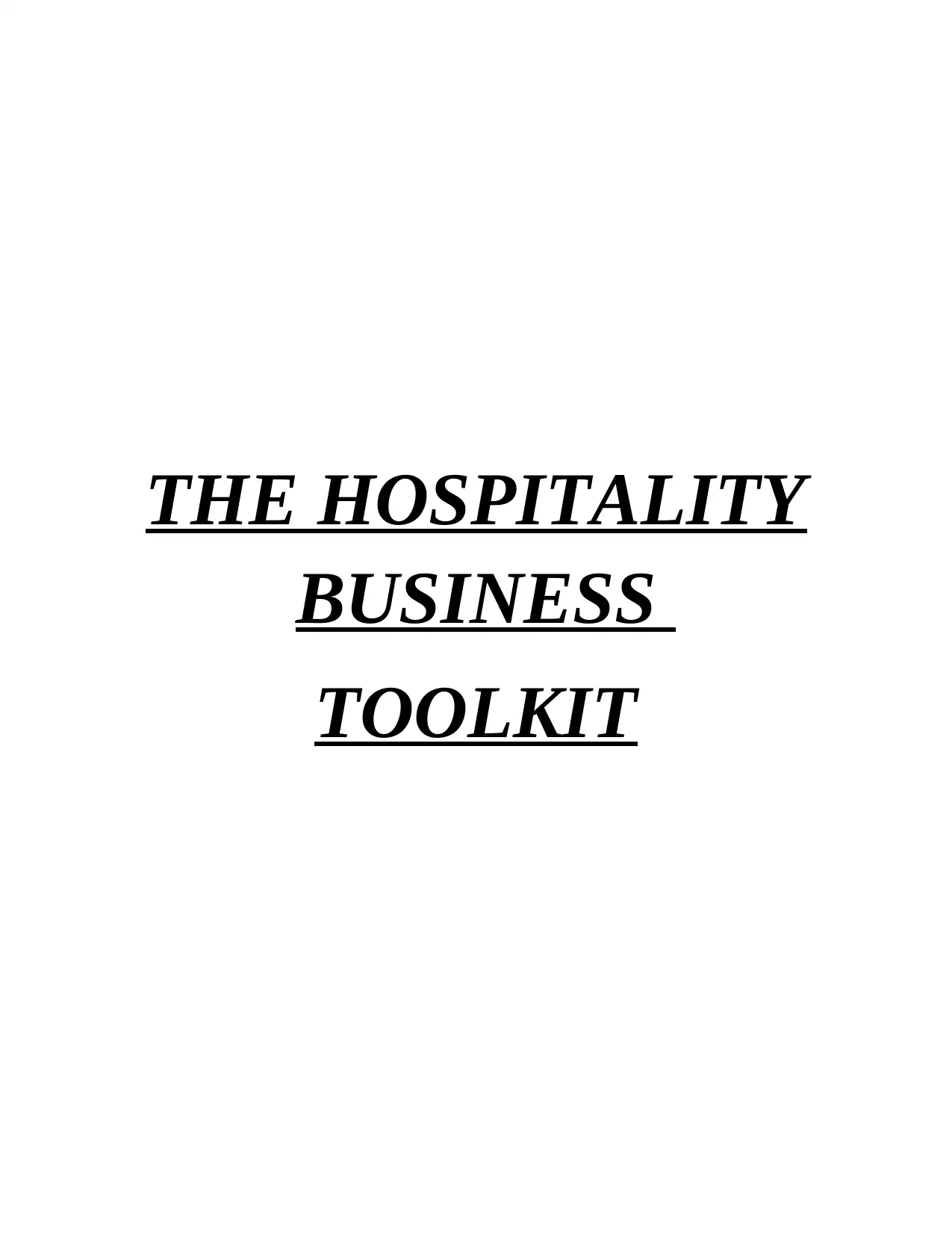
THE HOSPITALITY
BUSINESS
TOOLKIT
BUSINESS
TOOLKIT
Paraphrase This Document
Need a fresh take? Get an instant paraphrase of this document with our AI Paraphraser
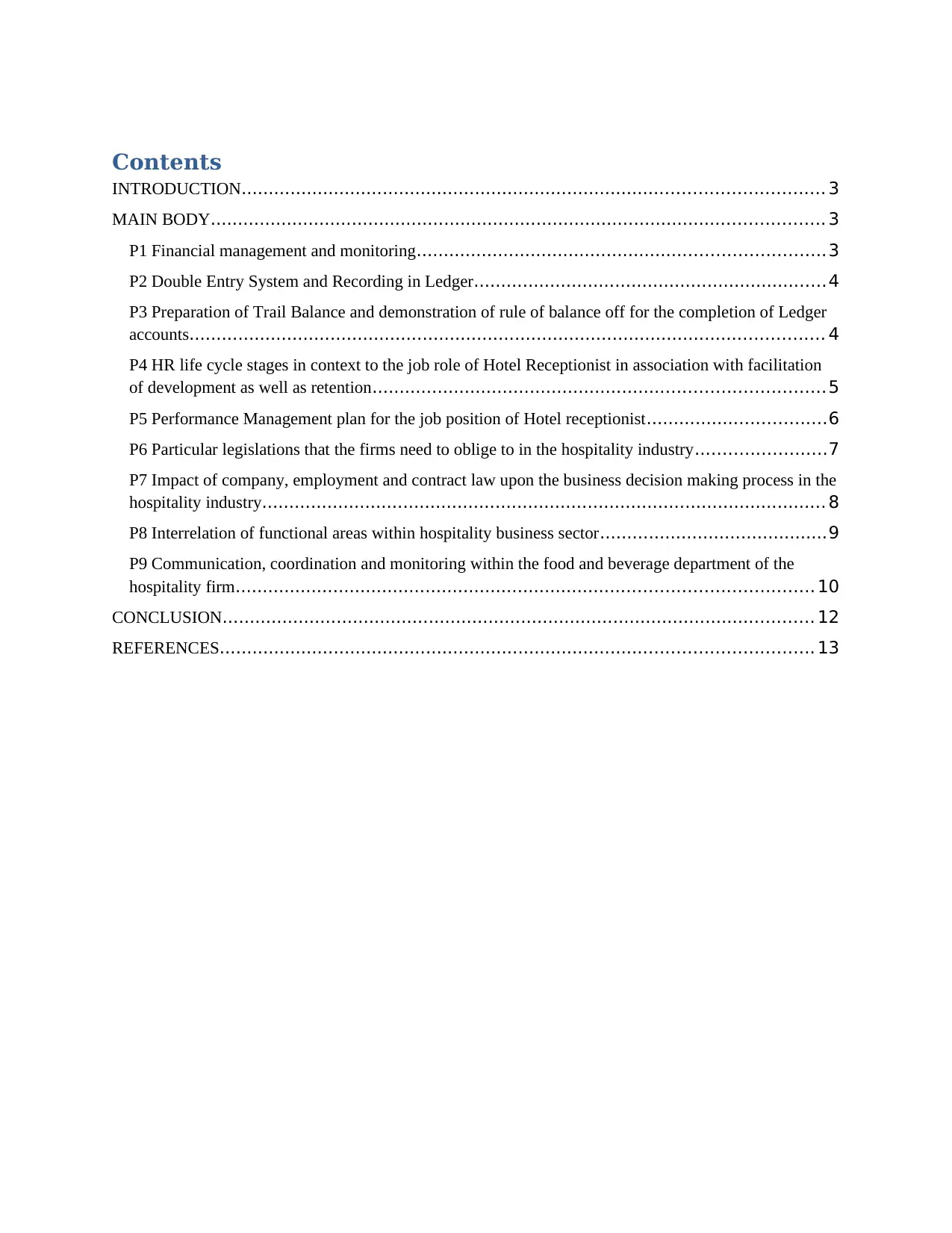
Contents
INTRODUCTION........................................................................................................... 3
MAIN BODY................................................................................................................. 3
P1 Financial management and monitoring...........................................................................3
P2 Double Entry System and Recording in Ledger.................................................................4
P3 Preparation of Trail Balance and demonstration of rule of balance off for the completion of Ledger
accounts..................................................................................................................... 4
P4 HR life cycle stages in context to the job role of Hotel Receptionist in association with facilitation
of development as well as retention...................................................................................5
P5 Performance Management plan for the job position of Hotel receptionist.................................6
P6 Particular legislations that the firms need to oblige to in the hospitality industry........................7
P7 Impact of company, employment and contract law upon the business decision making process in the
hospitality industry........................................................................................................ 8
P8 Interrelation of functional areas within hospitality business sector..........................................9
P9 Communication, coordination and monitoring within the food and beverage department of the
hospitality firm.......................................................................................................... 10
CONCLUSION............................................................................................................. 12
REFERENCES............................................................................................................. 13
INTRODUCTION........................................................................................................... 3
MAIN BODY................................................................................................................. 3
P1 Financial management and monitoring...........................................................................3
P2 Double Entry System and Recording in Ledger.................................................................4
P3 Preparation of Trail Balance and demonstration of rule of balance off for the completion of Ledger
accounts..................................................................................................................... 4
P4 HR life cycle stages in context to the job role of Hotel Receptionist in association with facilitation
of development as well as retention...................................................................................5
P5 Performance Management plan for the job position of Hotel receptionist.................................6
P6 Particular legislations that the firms need to oblige to in the hospitality industry........................7
P7 Impact of company, employment and contract law upon the business decision making process in the
hospitality industry........................................................................................................ 8
P8 Interrelation of functional areas within hospitality business sector..........................................9
P9 Communication, coordination and monitoring within the food and beverage department of the
hospitality firm.......................................................................................................... 10
CONCLUSION............................................................................................................. 12
REFERENCES............................................................................................................. 13
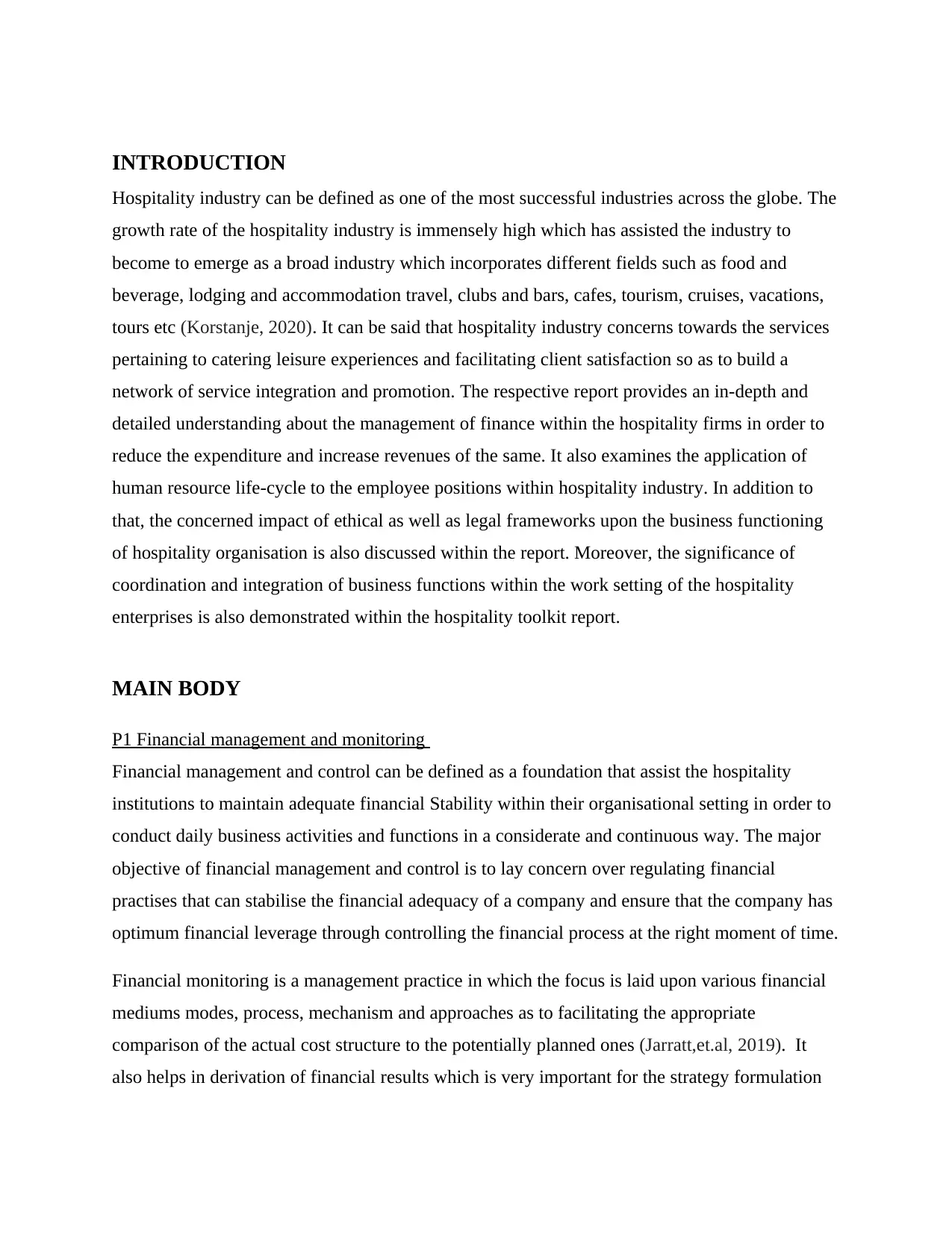
INTRODUCTION
Hospitality industry can be defined as one of the most successful industries across the globe. The
growth rate of the hospitality industry is immensely high which has assisted the industry to
become to emerge as a broad industry which incorporates different fields such as food and
beverage, lodging and accommodation travel, clubs and bars, cafes, tourism, cruises, vacations,
tours etc (Korstanje, 2020). It can be said that hospitality industry concerns towards the services
pertaining to catering leisure experiences and facilitating client satisfaction so as to build a
network of service integration and promotion. The respective report provides an in-depth and
detailed understanding about the management of finance within the hospitality firms in order to
reduce the expenditure and increase revenues of the same. It also examines the application of
human resource life-cycle to the employee positions within hospitality industry. In addition to
that, the concerned impact of ethical as well as legal frameworks upon the business functioning
of hospitality organisation is also discussed within the report. Moreover, the significance of
coordination and integration of business functions within the work setting of the hospitality
enterprises is also demonstrated within the hospitality toolkit report.
MAIN BODY
P1 Financial management and monitoring
Financial management and control can be defined as a foundation that assist the hospitality
institutions to maintain adequate financial Stability within their organisational setting in order to
conduct daily business activities and functions in a considerate and continuous way. The major
objective of financial management and control is to lay concern over regulating financial
practises that can stabilise the financial adequacy of a company and ensure that the company has
optimum financial leverage through controlling the financial process at the right moment of time.
Financial monitoring is a management practice in which the focus is laid upon various financial
mediums modes, process, mechanism and approaches as to facilitating the appropriate
comparison of the actual cost structure to the potentially planned ones (Jarratt,et.al, 2019). It
also helps in derivation of financial results which is very important for the strategy formulation
Hospitality industry can be defined as one of the most successful industries across the globe. The
growth rate of the hospitality industry is immensely high which has assisted the industry to
become to emerge as a broad industry which incorporates different fields such as food and
beverage, lodging and accommodation travel, clubs and bars, cafes, tourism, cruises, vacations,
tours etc (Korstanje, 2020). It can be said that hospitality industry concerns towards the services
pertaining to catering leisure experiences and facilitating client satisfaction so as to build a
network of service integration and promotion. The respective report provides an in-depth and
detailed understanding about the management of finance within the hospitality firms in order to
reduce the expenditure and increase revenues of the same. It also examines the application of
human resource life-cycle to the employee positions within hospitality industry. In addition to
that, the concerned impact of ethical as well as legal frameworks upon the business functioning
of hospitality organisation is also discussed within the report. Moreover, the significance of
coordination and integration of business functions within the work setting of the hospitality
enterprises is also demonstrated within the hospitality toolkit report.
MAIN BODY
P1 Financial management and monitoring
Financial management and control can be defined as a foundation that assist the hospitality
institutions to maintain adequate financial Stability within their organisational setting in order to
conduct daily business activities and functions in a considerate and continuous way. The major
objective of financial management and control is to lay concern over regulating financial
practises that can stabilise the financial adequacy of a company and ensure that the company has
optimum financial leverage through controlling the financial process at the right moment of time.
Financial monitoring is a management practice in which the focus is laid upon various financial
mediums modes, process, mechanism and approaches as to facilitating the appropriate
comparison of the actual cost structure to the potentially planned ones (Jarratt,et.al, 2019). It
also helps in derivation of financial results which is very important for the strategy formulation
⊘ This is a preview!⊘
Do you want full access?
Subscribe today to unlock all pages.

Trusted by 1+ million students worldwide
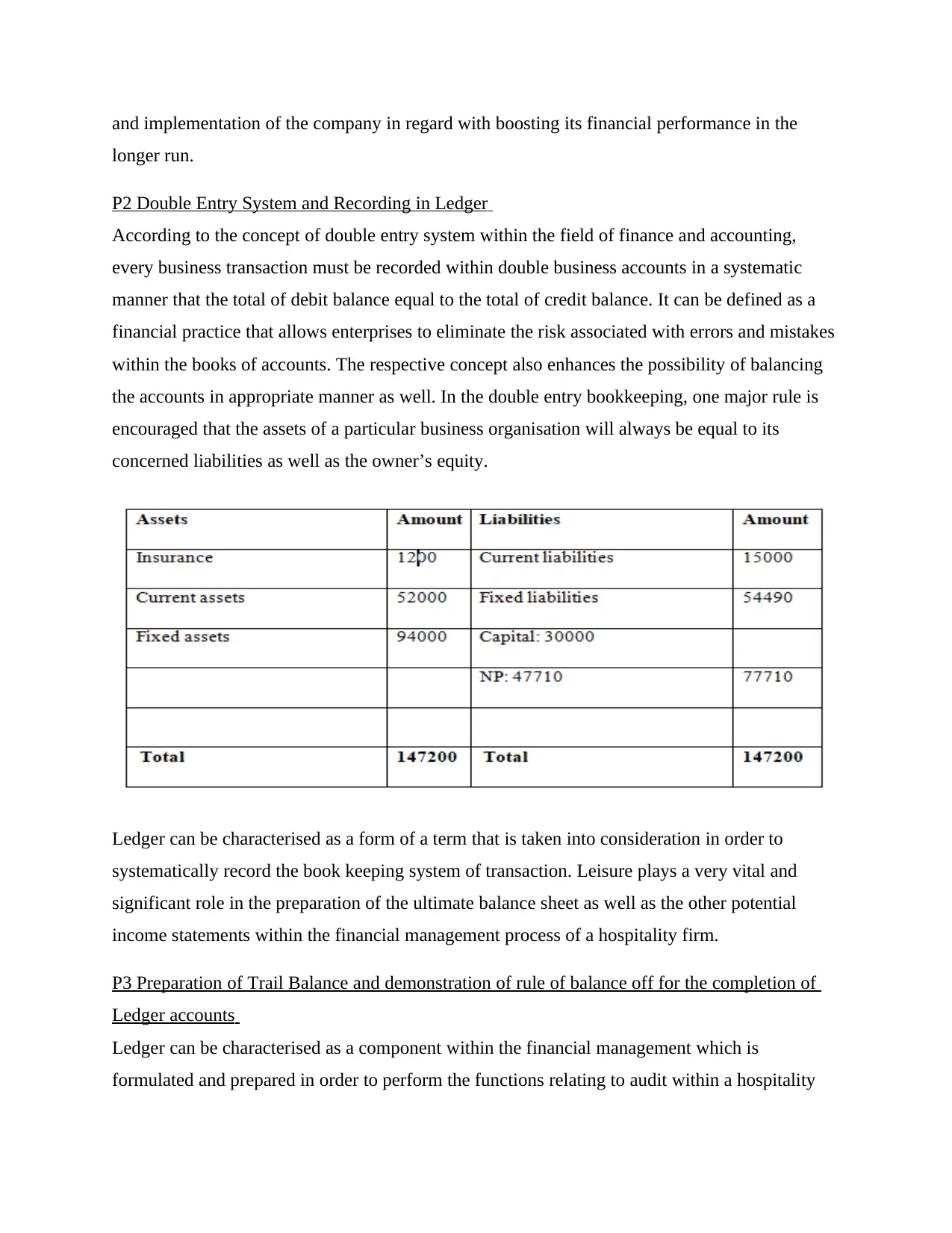
and implementation of the company in regard with boosting its financial performance in the
longer run.
P2 Double Entry System and Recording in Ledger
According to the concept of double entry system within the field of finance and accounting,
every business transaction must be recorded within double business accounts in a systematic
manner that the total of debit balance equal to the total of credit balance. It can be defined as a
financial practice that allows enterprises to eliminate the risk associated with errors and mistakes
within the books of accounts. The respective concept also enhances the possibility of balancing
the accounts in appropriate manner as well. In the double entry bookkeeping, one major rule is
encouraged that the assets of a particular business organisation will always be equal to its
concerned liabilities as well as the owner’s equity.
Ledger can be characterised as a form of a term that is taken into consideration in order to
systematically record the book keeping system of transaction. Leisure plays a very vital and
significant role in the preparation of the ultimate balance sheet as well as the other potential
income statements within the financial management process of a hospitality firm.
P3 Preparation of Trail Balance and demonstration of rule of balance off for the completion of
Ledger accounts
Ledger can be characterised as a component within the financial management which is
formulated and prepared in order to perform the functions relating to audit within a hospitality
longer run.
P2 Double Entry System and Recording in Ledger
According to the concept of double entry system within the field of finance and accounting,
every business transaction must be recorded within double business accounts in a systematic
manner that the total of debit balance equal to the total of credit balance. It can be defined as a
financial practice that allows enterprises to eliminate the risk associated with errors and mistakes
within the books of accounts. The respective concept also enhances the possibility of balancing
the accounts in appropriate manner as well. In the double entry bookkeeping, one major rule is
encouraged that the assets of a particular business organisation will always be equal to its
concerned liabilities as well as the owner’s equity.
Ledger can be characterised as a form of a term that is taken into consideration in order to
systematically record the book keeping system of transaction. Leisure plays a very vital and
significant role in the preparation of the ultimate balance sheet as well as the other potential
income statements within the financial management process of a hospitality firm.
P3 Preparation of Trail Balance and demonstration of rule of balance off for the completion of
Ledger accounts
Ledger can be characterised as a component within the financial management which is
formulated and prepared in order to perform the functions relating to audit within a hospitality
Paraphrase This Document
Need a fresh take? Get an instant paraphrase of this document with our AI Paraphraser
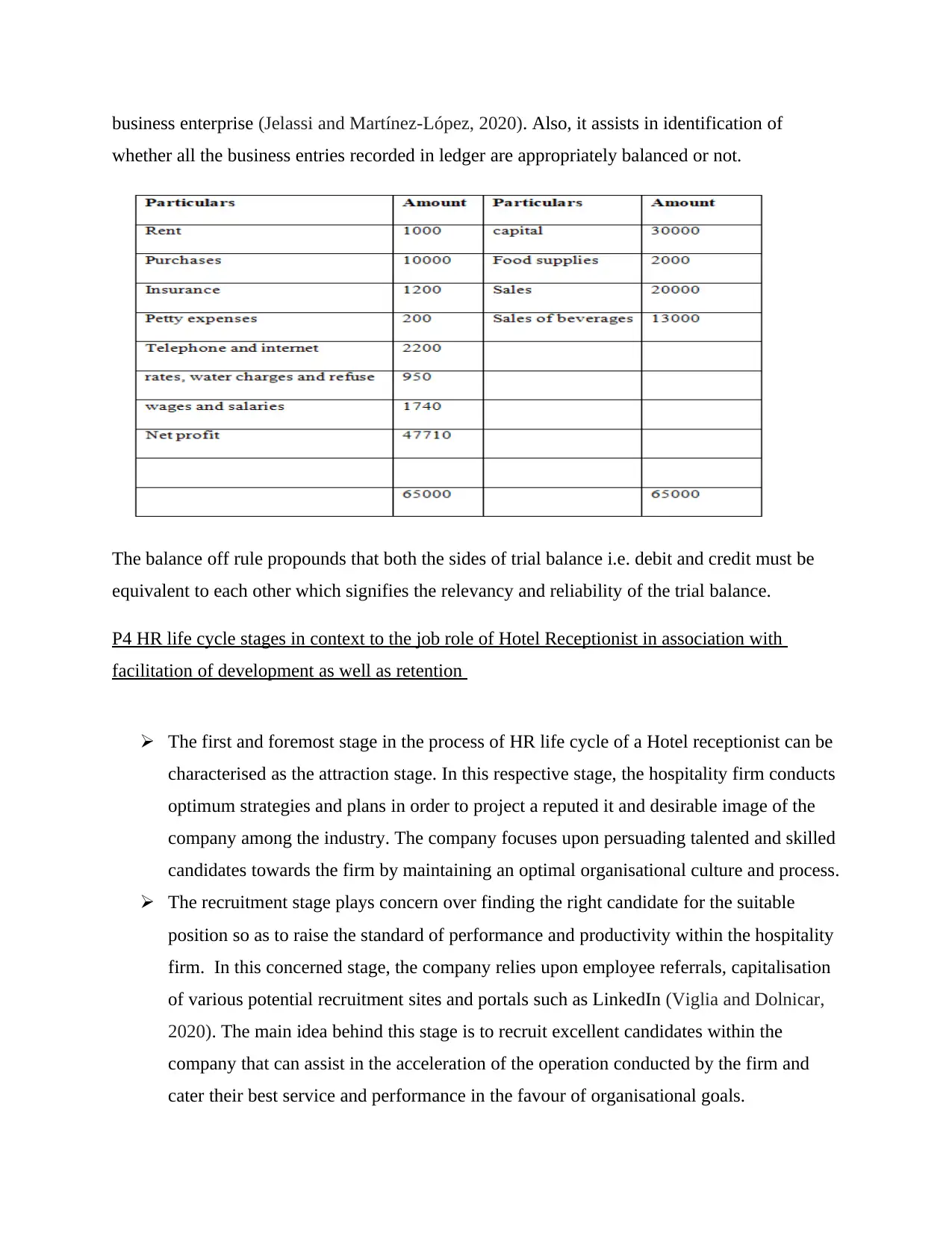
business enterprise (Jelassi and Martínez-López, 2020). Also, it assists in identification of
whether all the business entries recorded in ledger are appropriately balanced or not.
The balance off rule propounds that both the sides of trial balance i.e. debit and credit must be
equivalent to each other which signifies the relevancy and reliability of the trial balance.
P4 HR life cycle stages in context to the job role of Hotel Receptionist in association with
facilitation of development as well as retention
The first and foremost stage in the process of HR life cycle of a Hotel receptionist can be
characterised as the attraction stage. In this respective stage, the hospitality firm conducts
optimum strategies and plans in order to project a reputed it and desirable image of the
company among the industry. The company focuses upon persuading talented and skilled
candidates towards the firm by maintaining an optimal organisational culture and process.
The recruitment stage plays concern over finding the right candidate for the suitable
position so as to raise the standard of performance and productivity within the hospitality
firm. In this concerned stage, the company relies upon employee referrals, capitalisation
of various potential recruitment sites and portals such as LinkedIn (Viglia and Dolnicar,
2020). The main idea behind this stage is to recruit excellent candidates within the
company that can assist in the acceleration of the operation conducted by the firm and
cater their best service and performance in the favour of organisational goals.
whether all the business entries recorded in ledger are appropriately balanced or not.
The balance off rule propounds that both the sides of trial balance i.e. debit and credit must be
equivalent to each other which signifies the relevancy and reliability of the trial balance.
P4 HR life cycle stages in context to the job role of Hotel Receptionist in association with
facilitation of development as well as retention
The first and foremost stage in the process of HR life cycle of a Hotel receptionist can be
characterised as the attraction stage. In this respective stage, the hospitality firm conducts
optimum strategies and plans in order to project a reputed it and desirable image of the
company among the industry. The company focuses upon persuading talented and skilled
candidates towards the firm by maintaining an optimal organisational culture and process.
The recruitment stage plays concern over finding the right candidate for the suitable
position so as to raise the standard of performance and productivity within the hospitality
firm. In this concerned stage, the company relies upon employee referrals, capitalisation
of various potential recruitment sites and portals such as LinkedIn (Viglia and Dolnicar,
2020). The main idea behind this stage is to recruit excellent candidates within the
company that can assist in the acceleration of the operation conducted by the firm and
cater their best service and performance in the favour of organisational goals.
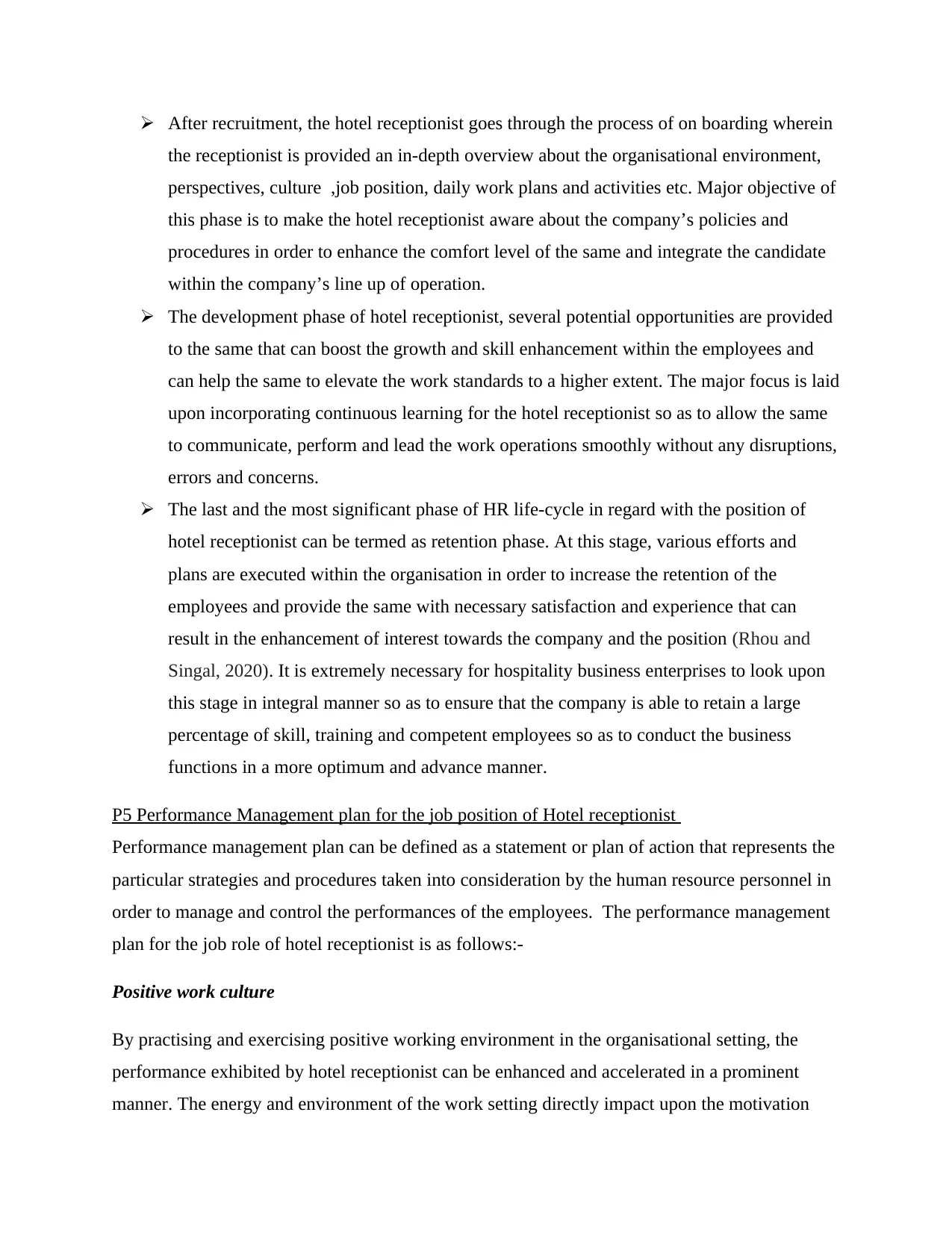
After recruitment, the hotel receptionist goes through the process of on boarding wherein
the receptionist is provided an in-depth overview about the organisational environment,
perspectives, culture ,job position, daily work plans and activities etc. Major objective of
this phase is to make the hotel receptionist aware about the company’s policies and
procedures in order to enhance the comfort level of the same and integrate the candidate
within the company’s line up of operation.
The development phase of hotel receptionist, several potential opportunities are provided
to the same that can boost the growth and skill enhancement within the employees and
can help the same to elevate the work standards to a higher extent. The major focus is laid
upon incorporating continuous learning for the hotel receptionist so as to allow the same
to communicate, perform and lead the work operations smoothly without any disruptions,
errors and concerns.
The last and the most significant phase of HR life-cycle in regard with the position of
hotel receptionist can be termed as retention phase. At this stage, various efforts and
plans are executed within the organisation in order to increase the retention of the
employees and provide the same with necessary satisfaction and experience that can
result in the enhancement of interest towards the company and the position (Rhou and
Singal, 2020). It is extremely necessary for hospitality business enterprises to look upon
this stage in integral manner so as to ensure that the company is able to retain a large
percentage of skill, training and competent employees so as to conduct the business
functions in a more optimum and advance manner.
P5 Performance Management plan for the job position of Hotel receptionist
Performance management plan can be defined as a statement or plan of action that represents the
particular strategies and procedures taken into consideration by the human resource personnel in
order to manage and control the performances of the employees. The performance management
plan for the job role of hotel receptionist is as follows:-
Positive work culture
By practising and exercising positive working environment in the organisational setting, the
performance exhibited by hotel receptionist can be enhanced and accelerated in a prominent
manner. The energy and environment of the work setting directly impact upon the motivation
the receptionist is provided an in-depth overview about the organisational environment,
perspectives, culture ,job position, daily work plans and activities etc. Major objective of
this phase is to make the hotel receptionist aware about the company’s policies and
procedures in order to enhance the comfort level of the same and integrate the candidate
within the company’s line up of operation.
The development phase of hotel receptionist, several potential opportunities are provided
to the same that can boost the growth and skill enhancement within the employees and
can help the same to elevate the work standards to a higher extent. The major focus is laid
upon incorporating continuous learning for the hotel receptionist so as to allow the same
to communicate, perform and lead the work operations smoothly without any disruptions,
errors and concerns.
The last and the most significant phase of HR life-cycle in regard with the position of
hotel receptionist can be termed as retention phase. At this stage, various efforts and
plans are executed within the organisation in order to increase the retention of the
employees and provide the same with necessary satisfaction and experience that can
result in the enhancement of interest towards the company and the position (Rhou and
Singal, 2020). It is extremely necessary for hospitality business enterprises to look upon
this stage in integral manner so as to ensure that the company is able to retain a large
percentage of skill, training and competent employees so as to conduct the business
functions in a more optimum and advance manner.
P5 Performance Management plan for the job position of Hotel receptionist
Performance management plan can be defined as a statement or plan of action that represents the
particular strategies and procedures taken into consideration by the human resource personnel in
order to manage and control the performances of the employees. The performance management
plan for the job role of hotel receptionist is as follows:-
Positive work culture
By practising and exercising positive working environment in the organisational setting, the
performance exhibited by hotel receptionist can be enhanced and accelerated in a prominent
manner. The energy and environment of the work setting directly impact upon the motivation
⊘ This is a preview!⊘
Do you want full access?
Subscribe today to unlock all pages.

Trusted by 1+ million students worldwide
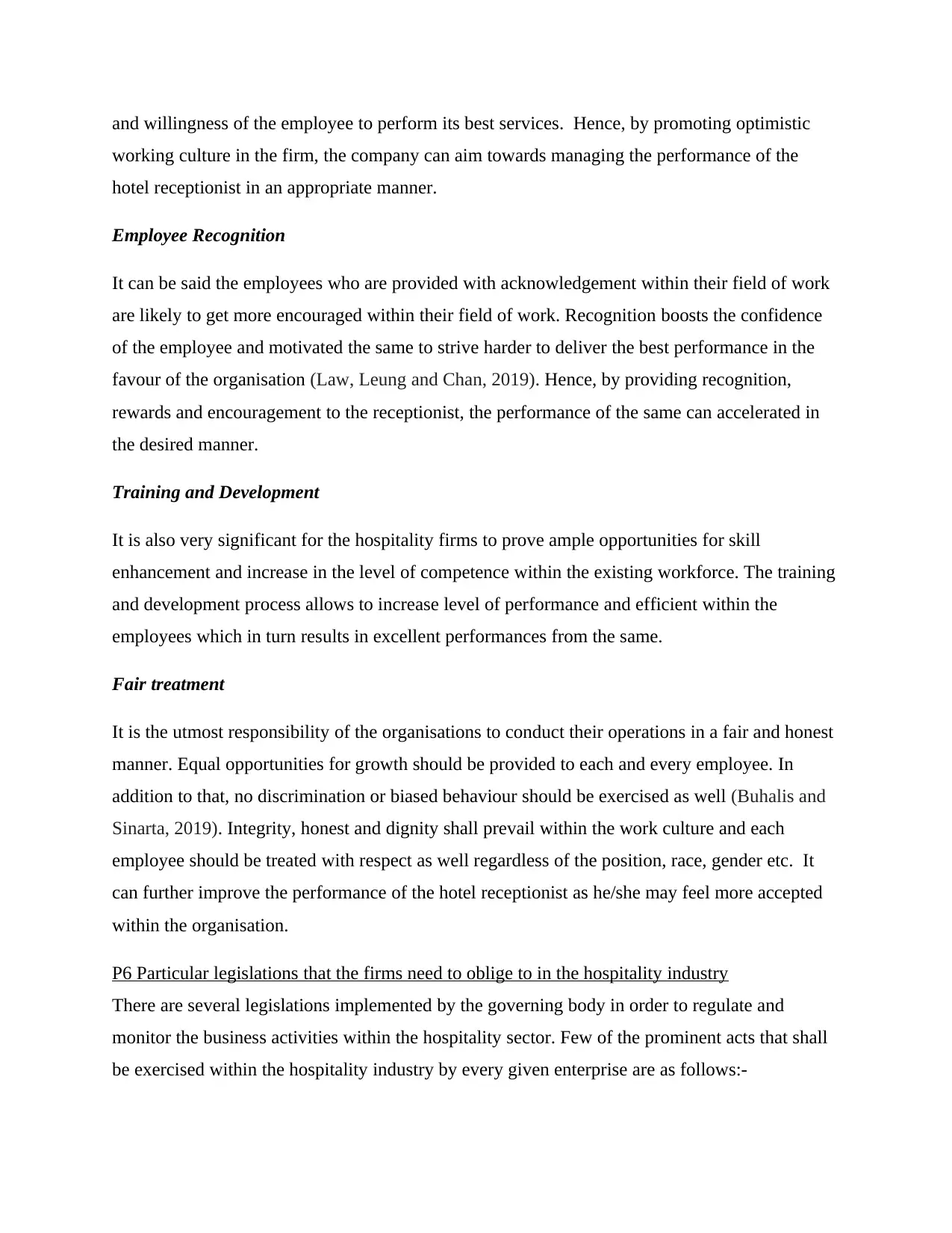
and willingness of the employee to perform its best services. Hence, by promoting optimistic
working culture in the firm, the company can aim towards managing the performance of the
hotel receptionist in an appropriate manner.
Employee Recognition
It can be said the employees who are provided with acknowledgement within their field of work
are likely to get more encouraged within their field of work. Recognition boosts the confidence
of the employee and motivated the same to strive harder to deliver the best performance in the
favour of the organisation (Law, Leung and Chan, 2019). Hence, by providing recognition,
rewards and encouragement to the receptionist, the performance of the same can accelerated in
the desired manner.
Training and Development
It is also very significant for the hospitality firms to prove ample opportunities for skill
enhancement and increase in the level of competence within the existing workforce. The training
and development process allows to increase level of performance and efficient within the
employees which in turn results in excellent performances from the same.
Fair treatment
It is the utmost responsibility of the organisations to conduct their operations in a fair and honest
manner. Equal opportunities for growth should be provided to each and every employee. In
addition to that, no discrimination or biased behaviour should be exercised as well (Buhalis and
Sinarta, 2019). Integrity, honest and dignity shall prevail within the work culture and each
employee should be treated with respect as well regardless of the position, race, gender etc. It
can further improve the performance of the hotel receptionist as he/she may feel more accepted
within the organisation.
P6 Particular legislations that the firms need to oblige to in the hospitality industry
There are several legislations implemented by the governing body in order to regulate and
monitor the business activities within the hospitality sector. Few of the prominent acts that shall
be exercised within the hospitality industry by every given enterprise are as follows:-
working culture in the firm, the company can aim towards managing the performance of the
hotel receptionist in an appropriate manner.
Employee Recognition
It can be said the employees who are provided with acknowledgement within their field of work
are likely to get more encouraged within their field of work. Recognition boosts the confidence
of the employee and motivated the same to strive harder to deliver the best performance in the
favour of the organisation (Law, Leung and Chan, 2019). Hence, by providing recognition,
rewards and encouragement to the receptionist, the performance of the same can accelerated in
the desired manner.
Training and Development
It is also very significant for the hospitality firms to prove ample opportunities for skill
enhancement and increase in the level of competence within the existing workforce. The training
and development process allows to increase level of performance and efficient within the
employees which in turn results in excellent performances from the same.
Fair treatment
It is the utmost responsibility of the organisations to conduct their operations in a fair and honest
manner. Equal opportunities for growth should be provided to each and every employee. In
addition to that, no discrimination or biased behaviour should be exercised as well (Buhalis and
Sinarta, 2019). Integrity, honest and dignity shall prevail within the work culture and each
employee should be treated with respect as well regardless of the position, race, gender etc. It
can further improve the performance of the hotel receptionist as he/she may feel more accepted
within the organisation.
P6 Particular legislations that the firms need to oblige to in the hospitality industry
There are several legislations implemented by the governing body in order to regulate and
monitor the business activities within the hospitality sector. Few of the prominent acts that shall
be exercised within the hospitality industry by every given enterprise are as follows:-
Paraphrase This Document
Need a fresh take? Get an instant paraphrase of this document with our AI Paraphraser
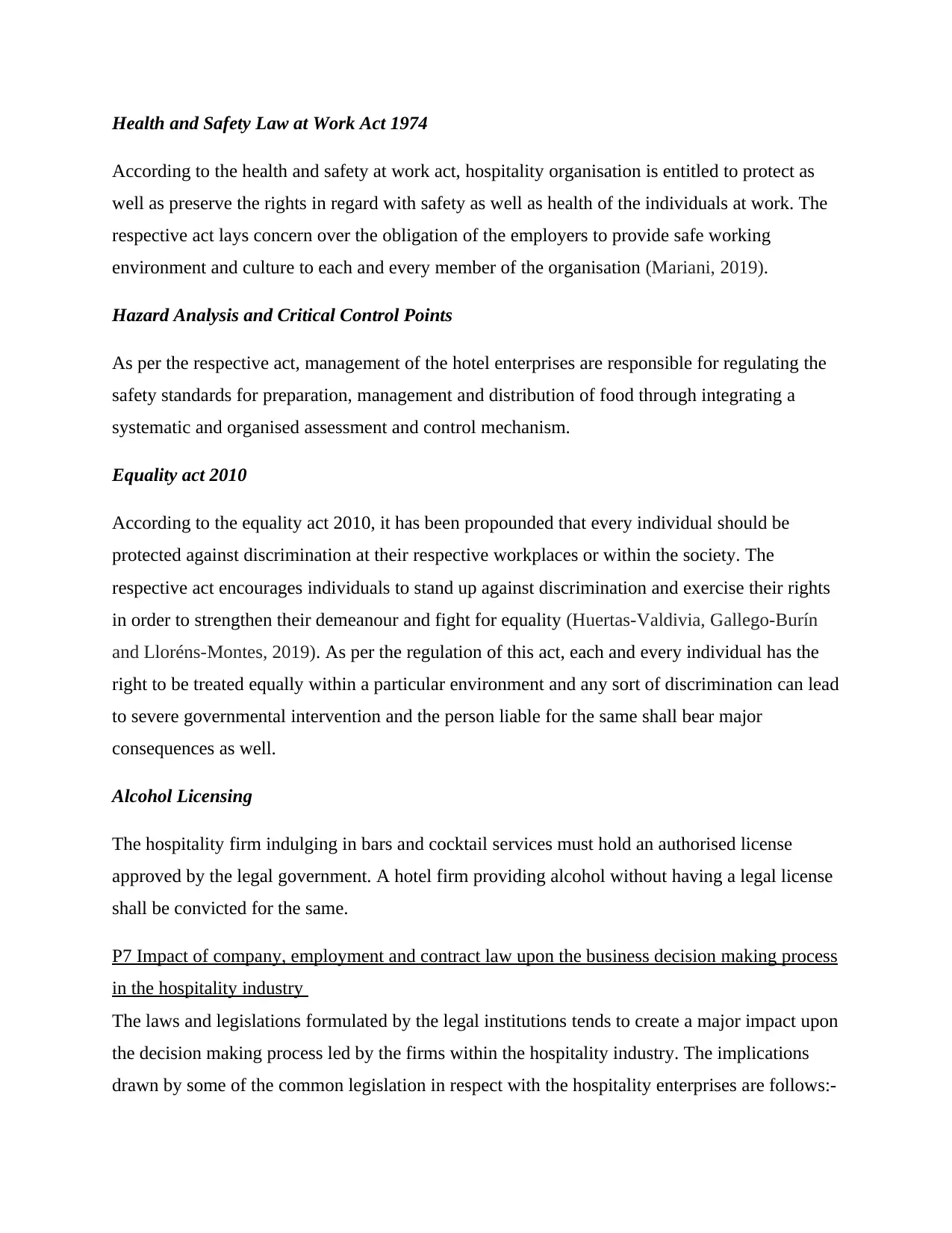
Health and Safety Law at Work Act 1974
According to the health and safety at work act, hospitality organisation is entitled to protect as
well as preserve the rights in regard with safety as well as health of the individuals at work. The
respective act lays concern over the obligation of the employers to provide safe working
environment and culture to each and every member of the organisation (Mariani, 2019).
Hazard Analysis and Critical Control Points
As per the respective act, management of the hotel enterprises are responsible for regulating the
safety standards for preparation, management and distribution of food through integrating a
systematic and organised assessment and control mechanism.
Equality act 2010
According to the equality act 2010, it has been propounded that every individual should be
protected against discrimination at their respective workplaces or within the society. The
respective act encourages individuals to stand up against discrimination and exercise their rights
in order to strengthen their demeanour and fight for equality (Huertas-Valdivia, Gallego-Burín
and Lloréns-Montes, 2019). As per the regulation of this act, each and every individual has the
right to be treated equally within a particular environment and any sort of discrimination can lead
to severe governmental intervention and the person liable for the same shall bear major
consequences as well.
Alcohol Licensing
The hospitality firm indulging in bars and cocktail services must hold an authorised license
approved by the legal government. A hotel firm providing alcohol without having a legal license
shall be convicted for the same.
P7 Impact of company, employment and contract law upon the business decision making process
in the hospitality industry
The laws and legislations formulated by the legal institutions tends to create a major impact upon
the decision making process led by the firms within the hospitality industry. The implications
drawn by some of the common legislation in respect with the hospitality enterprises are follows:-
According to the health and safety at work act, hospitality organisation is entitled to protect as
well as preserve the rights in regard with safety as well as health of the individuals at work. The
respective act lays concern over the obligation of the employers to provide safe working
environment and culture to each and every member of the organisation (Mariani, 2019).
Hazard Analysis and Critical Control Points
As per the respective act, management of the hotel enterprises are responsible for regulating the
safety standards for preparation, management and distribution of food through integrating a
systematic and organised assessment and control mechanism.
Equality act 2010
According to the equality act 2010, it has been propounded that every individual should be
protected against discrimination at their respective workplaces or within the society. The
respective act encourages individuals to stand up against discrimination and exercise their rights
in order to strengthen their demeanour and fight for equality (Huertas-Valdivia, Gallego-Burín
and Lloréns-Montes, 2019). As per the regulation of this act, each and every individual has the
right to be treated equally within a particular environment and any sort of discrimination can lead
to severe governmental intervention and the person liable for the same shall bear major
consequences as well.
Alcohol Licensing
The hospitality firm indulging in bars and cocktail services must hold an authorised license
approved by the legal government. A hotel firm providing alcohol without having a legal license
shall be convicted for the same.
P7 Impact of company, employment and contract law upon the business decision making process
in the hospitality industry
The laws and legislations formulated by the legal institutions tends to create a major impact upon
the decision making process led by the firms within the hospitality industry. The implications
drawn by some of the common legislation in respect with the hospitality enterprises are follows:-
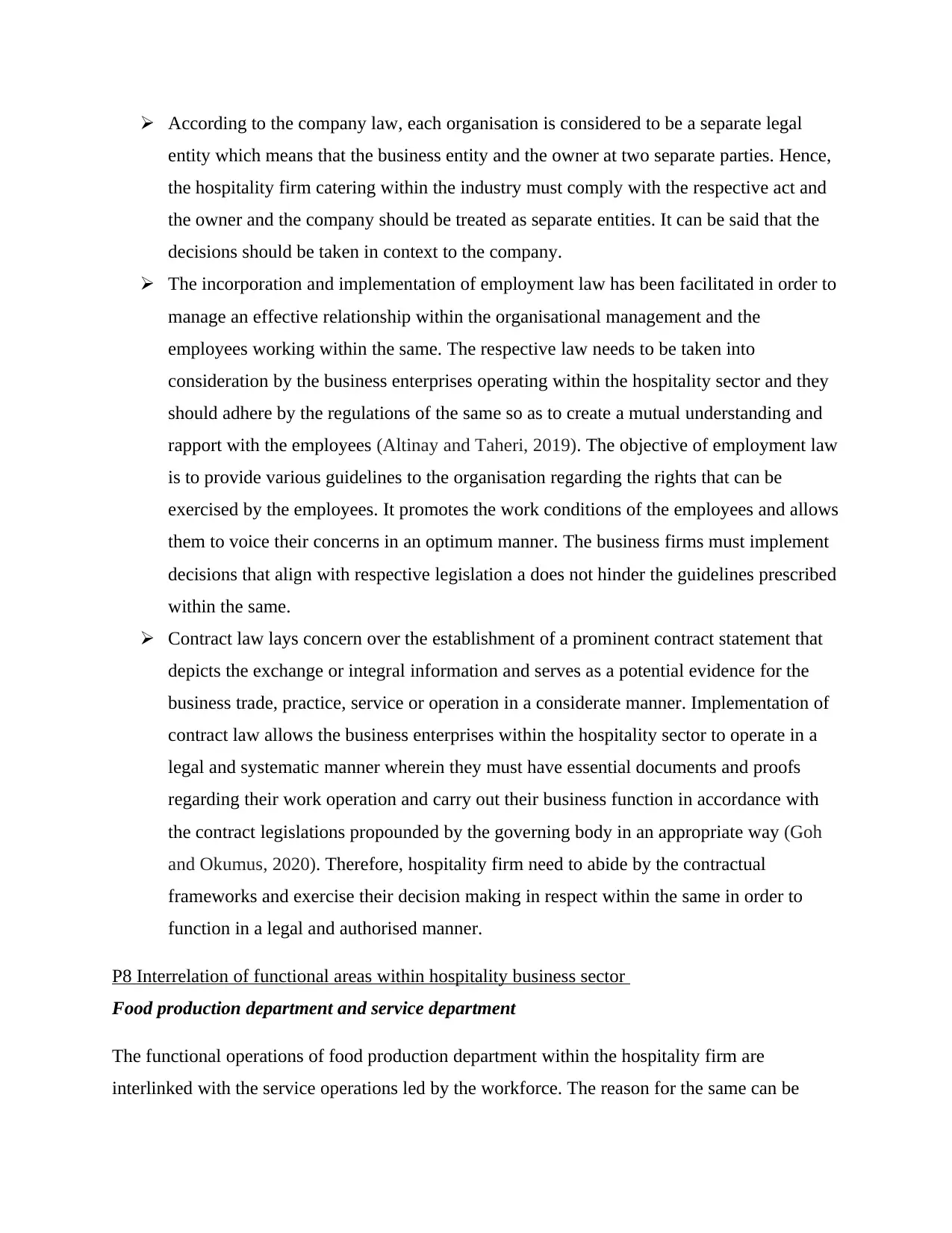
According to the company law, each organisation is considered to be a separate legal
entity which means that the business entity and the owner at two separate parties. Hence,
the hospitality firm catering within the industry must comply with the respective act and
the owner and the company should be treated as separate entities. It can be said that the
decisions should be taken in context to the company.
The incorporation and implementation of employment law has been facilitated in order to
manage an effective relationship within the organisational management and the
employees working within the same. The respective law needs to be taken into
consideration by the business enterprises operating within the hospitality sector and they
should adhere by the regulations of the same so as to create a mutual understanding and
rapport with the employees (Altinay and Taheri, 2019). The objective of employment law
is to provide various guidelines to the organisation regarding the rights that can be
exercised by the employees. It promotes the work conditions of the employees and allows
them to voice their concerns in an optimum manner. The business firms must implement
decisions that align with respective legislation a does not hinder the guidelines prescribed
within the same.
Contract law lays concern over the establishment of a prominent contract statement that
depicts the exchange or integral information and serves as a potential evidence for the
business trade, practice, service or operation in a considerate manner. Implementation of
contract law allows the business enterprises within the hospitality sector to operate in a
legal and systematic manner wherein they must have essential documents and proofs
regarding their work operation and carry out their business function in accordance with
the contract legislations propounded by the governing body in an appropriate way (Goh
and Okumus, 2020). Therefore, hospitality firm need to abide by the contractual
frameworks and exercise their decision making in respect within the same in order to
function in a legal and authorised manner.
P8 Interrelation of functional areas within hospitality business sector
Food production department and service department
The functional operations of food production department within the hospitality firm are
interlinked with the service operations led by the workforce. The reason for the same can be
entity which means that the business entity and the owner at two separate parties. Hence,
the hospitality firm catering within the industry must comply with the respective act and
the owner and the company should be treated as separate entities. It can be said that the
decisions should be taken in context to the company.
The incorporation and implementation of employment law has been facilitated in order to
manage an effective relationship within the organisational management and the
employees working within the same. The respective law needs to be taken into
consideration by the business enterprises operating within the hospitality sector and they
should adhere by the regulations of the same so as to create a mutual understanding and
rapport with the employees (Altinay and Taheri, 2019). The objective of employment law
is to provide various guidelines to the organisation regarding the rights that can be
exercised by the employees. It promotes the work conditions of the employees and allows
them to voice their concerns in an optimum manner. The business firms must implement
decisions that align with respective legislation a does not hinder the guidelines prescribed
within the same.
Contract law lays concern over the establishment of a prominent contract statement that
depicts the exchange or integral information and serves as a potential evidence for the
business trade, practice, service or operation in a considerate manner. Implementation of
contract law allows the business enterprises within the hospitality sector to operate in a
legal and systematic manner wherein they must have essential documents and proofs
regarding their work operation and carry out their business function in accordance with
the contract legislations propounded by the governing body in an appropriate way (Goh
and Okumus, 2020). Therefore, hospitality firm need to abide by the contractual
frameworks and exercise their decision making in respect within the same in order to
function in a legal and authorised manner.
P8 Interrelation of functional areas within hospitality business sector
Food production department and service department
The functional operations of food production department within the hospitality firm are
interlinked with the service operations led by the workforce. The reason for the same can be
⊘ This is a preview!⊘
Do you want full access?
Subscribe today to unlock all pages.

Trusted by 1+ million students worldwide
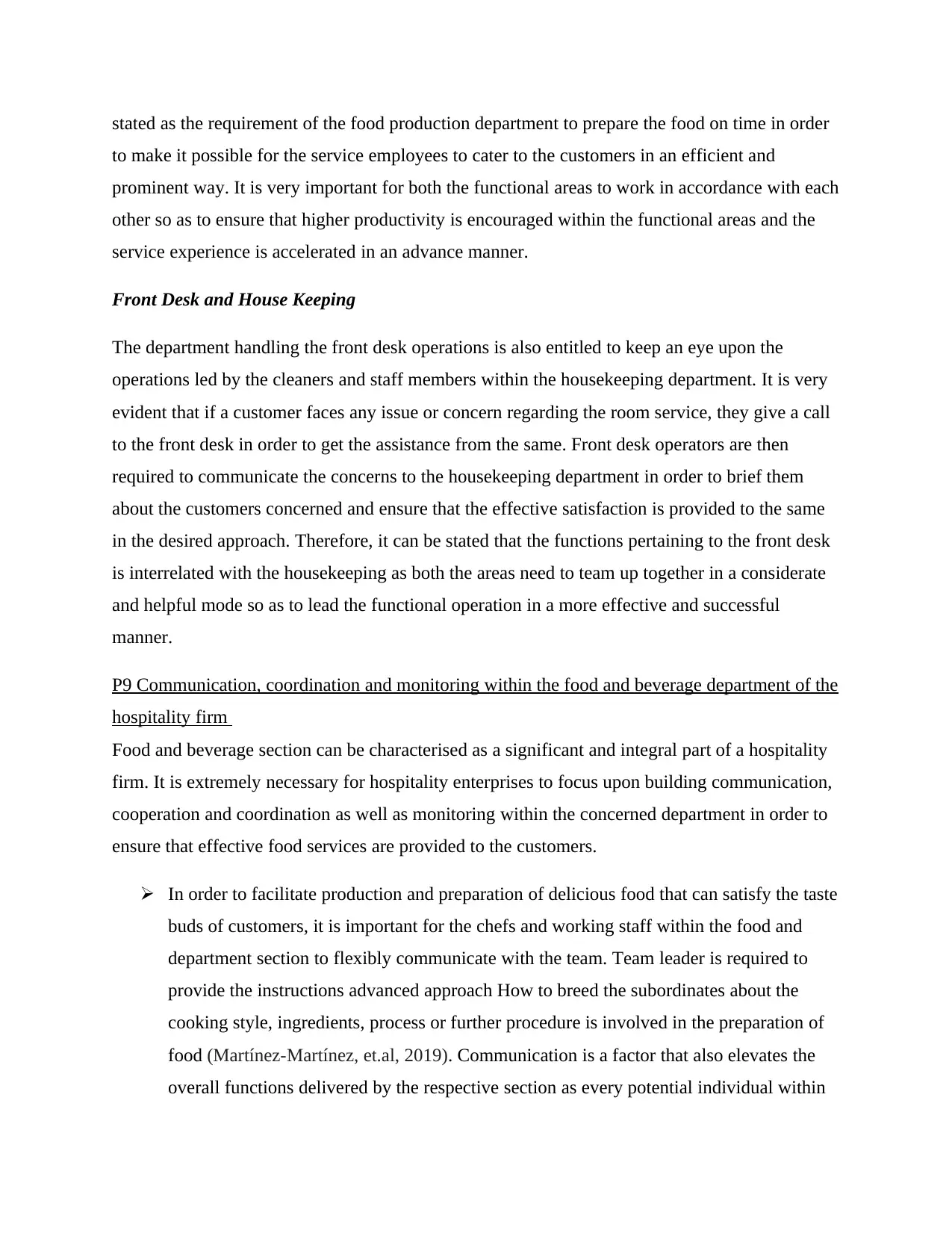
stated as the requirement of the food production department to prepare the food on time in order
to make it possible for the service employees to cater to the customers in an efficient and
prominent way. It is very important for both the functional areas to work in accordance with each
other so as to ensure that higher productivity is encouraged within the functional areas and the
service experience is accelerated in an advance manner.
Front Desk and House Keeping
The department handling the front desk operations is also entitled to keep an eye upon the
operations led by the cleaners and staff members within the housekeeping department. It is very
evident that if a customer faces any issue or concern regarding the room service, they give a call
to the front desk in order to get the assistance from the same. Front desk operators are then
required to communicate the concerns to the housekeeping department in order to brief them
about the customers concerned and ensure that the effective satisfaction is provided to the same
in the desired approach. Therefore, it can be stated that the functions pertaining to the front desk
is interrelated with the housekeeping as both the areas need to team up together in a considerate
and helpful mode so as to lead the functional operation in a more effective and successful
manner.
P9 Communication, coordination and monitoring within the food and beverage department of the
hospitality firm
Food and beverage section can be characterised as a significant and integral part of a hospitality
firm. It is extremely necessary for hospitality enterprises to focus upon building communication,
cooperation and coordination as well as monitoring within the concerned department in order to
ensure that effective food services are provided to the customers.
In order to facilitate production and preparation of delicious food that can satisfy the taste
buds of customers, it is important for the chefs and working staff within the food and
department section to flexibly communicate with the team. Team leader is required to
provide the instructions advanced approach How to breed the subordinates about the
cooking style, ingredients, process or further procedure is involved in the preparation of
food (Martínez-Martínez, et.al, 2019). Communication is a factor that also elevates the
overall functions delivered by the respective section as every potential individual within
to make it possible for the service employees to cater to the customers in an efficient and
prominent way. It is very important for both the functional areas to work in accordance with each
other so as to ensure that higher productivity is encouraged within the functional areas and the
service experience is accelerated in an advance manner.
Front Desk and House Keeping
The department handling the front desk operations is also entitled to keep an eye upon the
operations led by the cleaners and staff members within the housekeeping department. It is very
evident that if a customer faces any issue or concern regarding the room service, they give a call
to the front desk in order to get the assistance from the same. Front desk operators are then
required to communicate the concerns to the housekeeping department in order to brief them
about the customers concerned and ensure that the effective satisfaction is provided to the same
in the desired approach. Therefore, it can be stated that the functions pertaining to the front desk
is interrelated with the housekeeping as both the areas need to team up together in a considerate
and helpful mode so as to lead the functional operation in a more effective and successful
manner.
P9 Communication, coordination and monitoring within the food and beverage department of the
hospitality firm
Food and beverage section can be characterised as a significant and integral part of a hospitality
firm. It is extremely necessary for hospitality enterprises to focus upon building communication,
cooperation and coordination as well as monitoring within the concerned department in order to
ensure that effective food services are provided to the customers.
In order to facilitate production and preparation of delicious food that can satisfy the taste
buds of customers, it is important for the chefs and working staff within the food and
department section to flexibly communicate with the team. Team leader is required to
provide the instructions advanced approach How to breed the subordinates about the
cooking style, ingredients, process or further procedure is involved in the preparation of
food (Martínez-Martínez, et.al, 2019). Communication is a factor that also elevates the
overall functions delivered by the respective section as every potential individual within
Paraphrase This Document
Need a fresh take? Get an instant paraphrase of this document with our AI Paraphraser
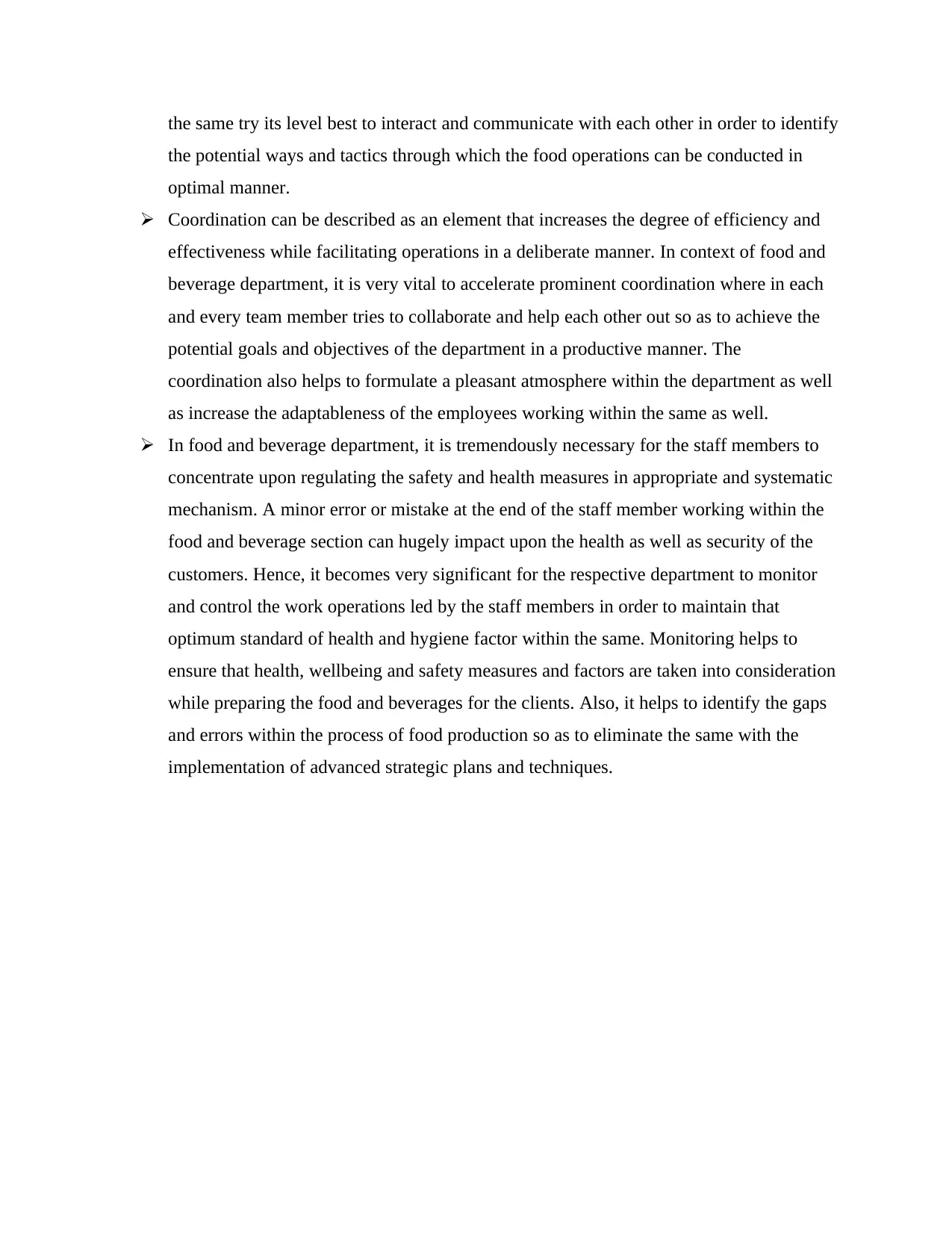
the same try its level best to interact and communicate with each other in order to identify
the potential ways and tactics through which the food operations can be conducted in
optimal manner.
Coordination can be described as an element that increases the degree of efficiency and
effectiveness while facilitating operations in a deliberate manner. In context of food and
beverage department, it is very vital to accelerate prominent coordination where in each
and every team member tries to collaborate and help each other out so as to achieve the
potential goals and objectives of the department in a productive manner. The
coordination also helps to formulate a pleasant atmosphere within the department as well
as increase the adaptableness of the employees working within the same as well.
In food and beverage department, it is tremendously necessary for the staff members to
concentrate upon regulating the safety and health measures in appropriate and systematic
mechanism. A minor error or mistake at the end of the staff member working within the
food and beverage section can hugely impact upon the health as well as security of the
customers. Hence, it becomes very significant for the respective department to monitor
and control the work operations led by the staff members in order to maintain that
optimum standard of health and hygiene factor within the same. Monitoring helps to
ensure that health, wellbeing and safety measures and factors are taken into consideration
while preparing the food and beverages for the clients. Also, it helps to identify the gaps
and errors within the process of food production so as to eliminate the same with the
implementation of advanced strategic plans and techniques.
the potential ways and tactics through which the food operations can be conducted in
optimal manner.
Coordination can be described as an element that increases the degree of efficiency and
effectiveness while facilitating operations in a deliberate manner. In context of food and
beverage department, it is very vital to accelerate prominent coordination where in each
and every team member tries to collaborate and help each other out so as to achieve the
potential goals and objectives of the department in a productive manner. The
coordination also helps to formulate a pleasant atmosphere within the department as well
as increase the adaptableness of the employees working within the same as well.
In food and beverage department, it is tremendously necessary for the staff members to
concentrate upon regulating the safety and health measures in appropriate and systematic
mechanism. A minor error or mistake at the end of the staff member working within the
food and beverage section can hugely impact upon the health as well as security of the
customers. Hence, it becomes very significant for the respective department to monitor
and control the work operations led by the staff members in order to maintain that
optimum standard of health and hygiene factor within the same. Monitoring helps to
ensure that health, wellbeing and safety measures and factors are taken into consideration
while preparing the food and beverages for the clients. Also, it helps to identify the gaps
and errors within the process of food production so as to eliminate the same with the
implementation of advanced strategic plans and techniques.
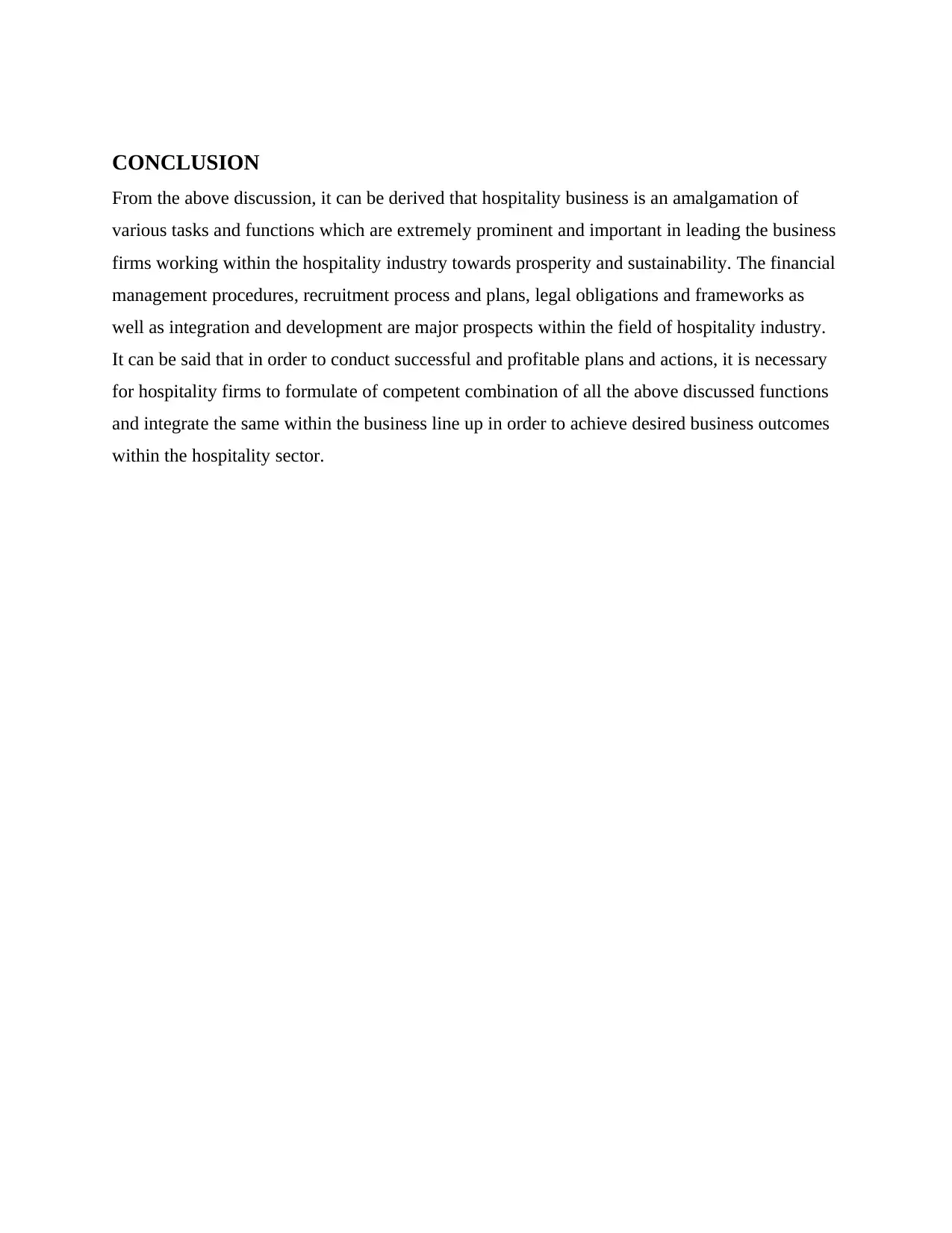
CONCLUSION
From the above discussion, it can be derived that hospitality business is an amalgamation of
various tasks and functions which are extremely prominent and important in leading the business
firms working within the hospitality industry towards prosperity and sustainability. The financial
management procedures, recruitment process and plans, legal obligations and frameworks as
well as integration and development are major prospects within the field of hospitality industry.
It can be said that in order to conduct successful and profitable plans and actions, it is necessary
for hospitality firms to formulate of competent combination of all the above discussed functions
and integrate the same within the business line up in order to achieve desired business outcomes
within the hospitality sector.
From the above discussion, it can be derived that hospitality business is an amalgamation of
various tasks and functions which are extremely prominent and important in leading the business
firms working within the hospitality industry towards prosperity and sustainability. The financial
management procedures, recruitment process and plans, legal obligations and frameworks as
well as integration and development are major prospects within the field of hospitality industry.
It can be said that in order to conduct successful and profitable plans and actions, it is necessary
for hospitality firms to formulate of competent combination of all the above discussed functions
and integrate the same within the business line up in order to achieve desired business outcomes
within the hospitality sector.
⊘ This is a preview!⊘
Do you want full access?
Subscribe today to unlock all pages.

Trusted by 1+ million students worldwide
1 out of 14
Related Documents
Your All-in-One AI-Powered Toolkit for Academic Success.
+13062052269
info@desklib.com
Available 24*7 on WhatsApp / Email
![[object Object]](/_next/static/media/star-bottom.7253800d.svg)
Unlock your academic potential
Copyright © 2020–2026 A2Z Services. All Rights Reserved. Developed and managed by ZUCOL.





